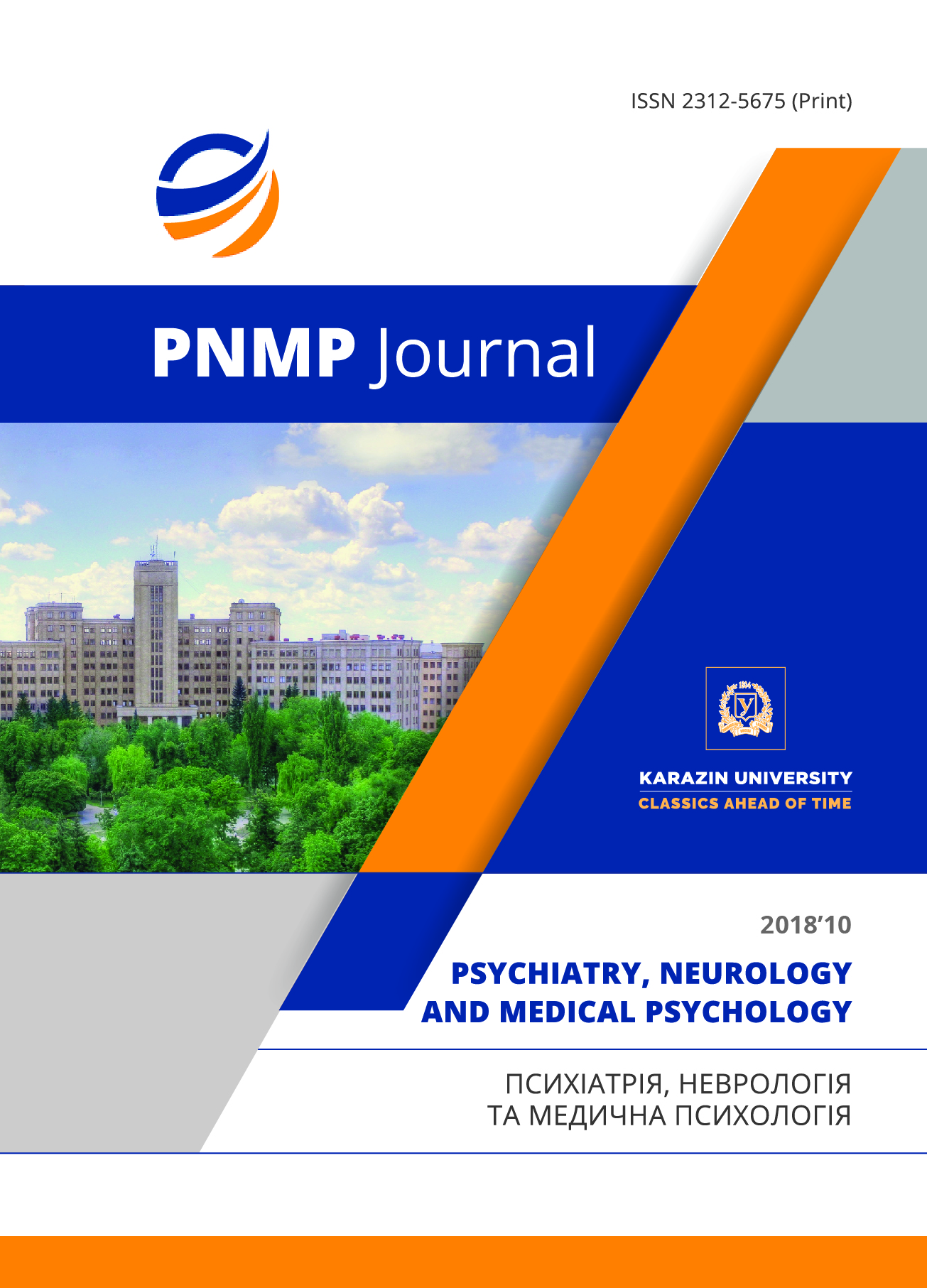Features of coping in patients with cerebrovascular pathology at different stages of diseases
Abstract
Coping is an important component in adapting a person to stressful events and maintaining a psychological balance. The aim of this work was to study the features of coping in patients with cerebrovascular pathology (CVP) in the dynamics of its development at different stages of the disease. At Kharkiv Regional Clinical Hospital - Emergency and Emergency Medicine Center during 2016-2018, observed 383 patients with cerebrovascular pathology on different stage of diseases. The coping assessed by using the Ways of Coping Questionnaire R. Lazarus & S. Folkman. In persons with high risk of CVP, clinical manifestations of CVP and patients after a stroke generally defined more tension of coping than in somatic healthy people. There occurred an imbalance forms of coping with low and high efficiency, dominated confrontation, distancing, avoidance versus problem solving, positive revaluation, increasing the role of social support as external psychosocial resource. Therefore, patients at various stages of CVP had unstable stress coping-profile that was on the one hand the basis for the development of stressrelated psychosomatic changes, on the other – not correctly solve the existing stress. Detection and psychological correction of ineffective coping strategies in patients with CVP is an important component of psychological help for this contingent of patients.
Downloads
References
Weber, H. Belastungsverarbeitung // Z. fur KlinischePsychologic. 1992. Bd. 21. Р. 17-27.
Церковский А. Л. Современные взгляды на копинг-проблему // Вестник ВГМУ. 2006. №3. С. 112 – 121.
Fisher DW, Han Y, Lyman KA, Heuermann RJ, Bean LA, Ybarra N, Foote KM, Dong H, Nicholson DA, Chetkovich DM. HCN channels in the hippocampus regulate active coping behavior // J Neurochem. 2018. Vol. 146(6). P. 753-766.
Donnellan C, Hevey D, Hickey A, O'Neill D. Defining and quantifying coping strategies after stroke: a review // J NeurolNeurosurg Psychiatry. 2006. Vol. 77(11). P. 1208-18.
Wei C., Zhang F., Chen L., Ma X., Zhang N., Hao J. Factors associated with post-stroke depression and fatigue: lesion location and coping styles // J Neurol. 2016. Vol. 263(2). P. 269-276.
Tielemans NS, Visser-Meily JM, Schepers VP, Post MW, van Heugten CM. Proactive coping poststroke: psychometric properties of the Utrecht Proactive Coping Competence Scale // Arch Phys Med Rehabil. 2014. Vol. 95(4). P. 670-5.
Tielemans NS, Schepers VP, Visser-Meily JM, Post MW, van Heugten CM. Associations of proactive coping and self-efficacy with psychosocial outcomes in individuals after stroke // Arch Phys Med Rehabil. 2015. Vol. 96(8). P. 1484-91.
Долганова Н. П. Стресс-совладающее поведение лиц с повышенным кардиометаболическим риском // Известия РГПУ им. А.И. Герцена. 2012. №153-1. С. 197 – 205.
Darlington AS, Dippel DW, Ribbers GM, van Balen R, Passchier J, Busschbach JJ.A prospective study on coping strategies and quality of life in patients after stroke, assessing prognostic relationships and estimates of costeffectiveness // J Rehabil Med. 2009. Vol. 41(4). P. 237-41.
Lo Buono V., Corallo F., Bramanti P., Marino S. Coping strategies and health-related quality of life after stroke // J Health Psychol. 2017. Vol. 22(1). P. 16-28.
Darlington AS, Dippel DW, Ribbers GM, van Balen R, Passchier J, Busschbach J. Coping strategies as determinants of quality of life in stroke patients: a longitudinal study // J.Cerebrovasc Dis. 2007.Vol. 23(5-6).P. 401-7.
Вишнева А.Е. Динамика стратегий совладания у больных c последствиями инсультов и черепномозговых травм // Национальный психологический журнал.2013. №1(9). с.103–109.
Visser MM, Heijenbrok-Kal MH, Van'tSpijker A, Lannoo E, Busschbach JJ, Ribbers GM.Problem Solving Therapy During Outpatient Stroke Rehabilitation Improves Coping and Health-Related Quality of Life: Randomized Controlled Trial // Stroke. 2016. Vol. 47(1). P. 135-42.
Visser MM, Heijenbrok-Kal MH, Spijker AV, Oostra KM, Busschbach JJ, Ribbers GM. Coping, problem solving, depression, and health-related quality of life in patients receiving outpatient stroke rehabilitation // Arch Phys Med Rehabil. 2015. Vol. 96(8). P. 1492-8.

